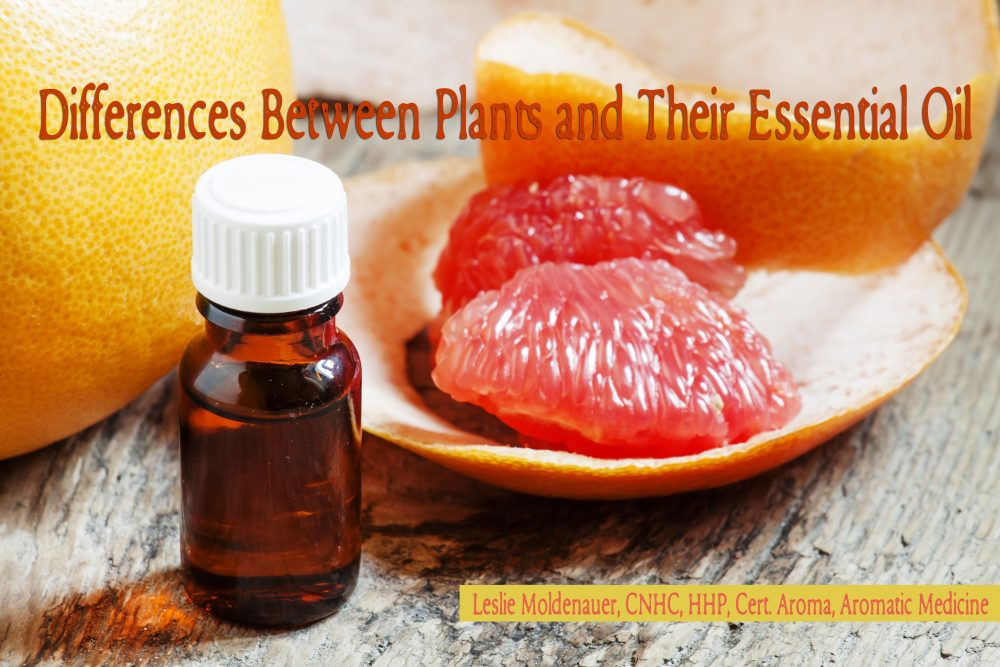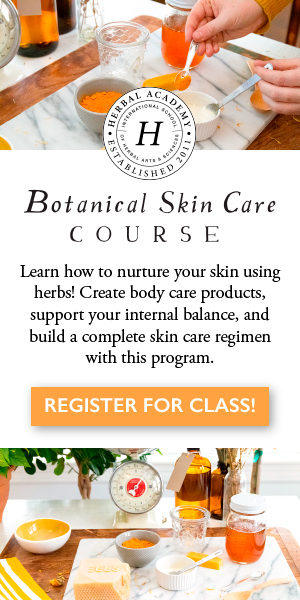It goes without saying that essential oils come from plants, but this does not necessarily mean that the therapeutic benefits or uses from the plant to essential oil is the same. In many cases, this does not hold true. What are the differences between plants and their essential oil? It can be quite significant.
There can be crossovers such as with lavender for example. A cup of herbal lavender tea will help to relax you as will a good sniff of Lavender Lavandula angustifolia essential oil. Oftentimes, you can find proposed uses for essential oils on the Internet and social media that are solely based on how the plant (herb, spice, fruit) originated from that essential oil has been historically used.
Many assumptions are made, so my goal today is to talk about the differences between the two.
Nutritional Content-Herbs Vs Essential Oils
Herbs and spices have been used for centuries for their nutritional benefits. As a matter of fact, many were celebrated for their medicinal property, long before their culinary use. The oldest written evidence of medicinal plants’ usage for the preparation of drugs has been found on a Sumerian clay slab from Nagpur, approximately 5000 years old (1).
We all know that herbs contain vitamins, minerals, antioxidants, phytonutrients, protein and much much more. They are powerhouses for our health, can be used for many things that ail us, and are powerful tools to restore homeostasis. Herbal medicines are just one type of dietary supplement. They are sold as tablets, capsules, powders, teas, extracts, and fresh or dried plants. Essential oils, however, contain no nutrition at all, and therefore cannot be considered supplements.
How can that be you ask? Let’s briefly look at the facts. Steam distillation, which is the most common form of extracting essential oils is done so by placing plant material in a still; steam from boiled water is passed through the plant material and is then cooled to collect the essential oil. This essentially separates the volatiles from the non-volatiles. This is done right around 100° C/212° F (on average). All essential oils are very volatile (this is very important to remember).
There are two important key points here; the first is the heat of steam distillation. The second is volatiles vs non-volatiles. When we look at vitamins and minerals, they degrade at specific temperatures. B vitamins degrade right around room temperature, 20 to 25° C or 68 to 77° F. This is much lower than the temperature of steam distillation; therefore no B vitamins will be present in essential oils (2).
Vitamin C is the most popular claim when it comes to citrus essential oils. Many are told to place citrus essential oil in their water daily or multiple times a day to obtain the daily dose of vitamin C. Vitamin C degrades at 70° C or 158° F, showing it is not possible to have any vitamin C in citrus steam distilled oil (3). Even when looking at the cold-pressed essential oil, the amount of vitamin C is extremely minute.
Read more about this here.
In addition, B and C vitamins are water-soluble. Any water-soluble vitamin will be left in the water, and will not make it through steam distillation to the fat-soluble essential oil. (Minerals are also water-soluble).
Lipids or fat-soluble vitamins such as A, D, E, and K are non-volatiles. Remember above where I said that the end product of steam distillation contained only volatiles? This shows beyond a shadow of a doubt, that essential oils contain no vitamins or minerals.
As mentioned above, the essential oil that is steam distilled contains only volatile material. This is very different from the herb or the whole plant, which contains volatiles and non-volatiles.
After looking at the chemistry of essential oil and the distillation process, it becomes easy to see that essential oils could not possibly contain nutrients, or on their own be considered a supplement.
Want to understand more about fat-soluble vs water-soluble vitamins? Read more here.
Cinnamon
Cinnamon is a spice that comes from the branches of wild trees that belong to the genus “Cinnamomum”.
Cinnamon and other spices and herbs rich in plant polyphenols can help control blood sugar and insulin spikes after meals (4). One placebo-controlled trial found that a supplement containing cassia cinnamon, chromium and carnosine successfully lowered fasting blood sugar in people with pre-diabetes (5). When polyphenols are studied, we know that there are many health benefits associated with them.
Since essential oils do not contain nutrients, we can see that cinnamon essential oil can not beyond a shadow of a doubt have the capacity to lower blood sugar…even though you can go and do a quick Google search and find that exact claim very easily. It is important to do your research and understand the science.
The cautions from the spice to the essential oil also vary. You would need to take very large amounts of the spice to have any real risk; the essential oil(s) however have quite a few such as potential drug interactions, possible issues for those with blood clotting concerns and an increased risk of skin irritation/sensitization to name a few. For more on the cautions and contraindications of cinnamon essential oil, refer to Robert Tisserand’s, Essential Oil Safety 2e. Learn more about the cautions of the spice here.
Fennel
Fennel Foeniculum vulgare essential oil is often claimed on the Internet to be able to increase a mother’s breast milk. Is fennel essential oil safe during pregnancy as well as lactation? Fennel essential oil and specifically the chemical constituent (E)-anethole in fennel is a known hormonal modulator (6). This is essentially a substance that regulates the hormones of the body. Why is this an issue during this passage of life? The entire function of the body relies on an extremely precise conversation between the central nervous system (CNS) and hormones.
Hormones regulate essentially all body functions, a few of them are storage and usage of nutrients, growth, and development, electrolyte balance, but most importantly for the purposes of this article=reproductive functions (7).
Hormonal changes associated with our moon cycle may bring about the following temporary conditions: tender nipples, varying levels of irritability, headaches (often associated with the hormonal shift during PMS), a slight dip in milk supply (usually not a big problem), and the hormone prolactin that is responsible for mother’s letdown and overall production of milk, enabling her to feed her nursling (8).
You can compare this hormonal modulation to the birth control pill. Doctors will not place you on a birth control pill containing estrogen as a newly lactating mother, simply because of the altering of hormones. An OB/GYN doctor will typically prescribe a progesterone-only pill, or recommend waiting all-together, as there are so many unknowns involved during this time.
Whether or not fennel essential oil even has the capability to increase milk production is a moot point, as safety or in this case lack of safety for mom and baby, outweigh any possible, potential benefit.
Fennel, the herb, can increase mother’s milk, but also carries with it a certain amount of risk as well. According to WebMD, “during breastfeeding, fennel is POSSIBLY UNSAFE. It’s been reported that two breastfeeding infants experienced damage to their nervous systems after their mothers drank an herbal tea that contained fennel” (9). Is this a stretch? Possibly..maybe….
They go on to further say avoid fennel in these instances:
Bleeding disorders: Fennel might slow blood clotting. Taking fennel might increase the risk of bleeding or bruising in people with bleeding disorders. Reiterating from the hormone conversation above, hormone-sensitive conditions such as breast cancer, uterine cancer, ovarian cancer, endometriosis, or uterine fibroids: “Fennel might act like estrogen. If you have any condition that might be made worse by exposure to estrogen, do not use fennel” (10).
Despite these facts, many are still recommending massaging above the nipple with fennel essential oil to increase breast milk supply. If you know someone who does this, please share with them the facts and concerns of this practice for themselves and their nursling.
Grapefruit
Grapefruit Citrus paradisi essential oil, coming from the rind of the fruit is very different from the other two examples, however, the generalizations made between what the fruit provides us versus the essential oil is perhaps the most significant of the three.
It is assumed that taking grapefruit essential oil internally in water will 1-detoxify you/cleanse the body, 2-help you to lose weight, 3-uplift mood.
The truth is, 1-essential oils do not cleanse the body or detoxify you. Taking grapefruit essential oil in water will likely put added stress on the body (liver), as your body will quickly work to remove the “foreign material”. 2-inhaling grapefruit essential oil can help to manage cravings due to its sweet scent (this can be construed as helping to not “gain weight” or to help initiate weight loss)(11) and 3-inhaling grapefruit essential oil can uplift mood. As you can see, an understanding method of use for the intended outcome is really important.
The true grapefruit is full of nutrients such as vitamins A, C, potassium, lycopene, etc. It is easy to see that grapefruit has a stellar nutrient profile. Perhaps the most impressive is that even though it contains plenty of natural sugar, it is extremely low in the glycemic index (GI) so it does not affect blood sugar levels. Many studies suggest that it decreases the risk of heart disease and diabetes, and has been proven to help you to lose weight (12).
Closing
After reading through all of this information, you may be wondering if I believe essential oils work! I assure you that I adore them and have seen their benefits first hand. My goal is to help you to see their limitations, to understand the many myths that are out there in cyberspace. Essential oils are a fantastic complementary modality, and when respected, curated, and cared for, they can have many benefits to our overall health and wellness.
References
(1) Kelly K. History of medicine. New York: Facts on file; 2009. pp. 29–50
Petrovska, B. (2012) Historical review of medicinal plants’ usage. Pharmacognosy Review. Jan-Jun; 6(11): 1–5.
(2) Fortification basics, stability. Retrieved from https://www.dsm.com/content/dam/dsm/nip/en_US/documents/stability.pdf
(3) Rahmawati, S., Bundjali, B. Kinetics of the oxidation of vitamin c. Retrieved from http://www.researchgate.net/publication/228484005_KINETICS_OF_THE_OXIDATION_OF_VITAMIN_C
(4) Bozzetto, L. et.al. Polyphenol-rich diets improve glucose metabolism in people at high cardiometabolic risk: a controlled randomised intervention trial. Diabetologia 2015 Jul;58(7):1551-60
(5) liu, Y. et.al (2015) A Dietary Supplement Containing Cinnamon, Chromium and Carnosine Decreases Fasting Plasma Glucose and Increases Lean Mass in Overweight or Obese Pre-Diabetic Subjects: A Randomized, Placebo-Controlled Trial. PLOS One. Sep 25;10(9):e0138646
(6) Tisserand, R., Young, R., Essential Oil Safety2e (2014) (p277-278)
(7) Hormones. Retrieved from
http://www.hormone.org/hormones-and-health/types-of-hormones
(8) About Hormone Imbalance. Retrieved from
(9) (10) WebMD Fennel. Retrieved from: http://www.webmd.com/vitamins-supplements/ingredientmono-311-fennel.aspx?activeingredientid=311&activeingredientname=fennel
(11) Shen, J. et.al (2005) Olfactory stimulation with scent of grapefruit oil affects autonomic
nerves, lipolysis and appetite in rats. Science Direct. 289–294
(12) Hawrelak, J., Myers P. Grapefruit Causes Weight Loss. Journal of Complementary Medicine. Vol. 6, No. 1, Jan/Feb 2007: 76-77
BEFORE YOU GO! Remember to sign up for my FREE Facebook group! Hang out with me and THOUSANDS of other Essential Oil lovers looking to learn, click on to join Real Essential Oil Education Group!
Like so many practices in life I encourage you to become educated on the proper use of essential oils. When using them, please do so cautiously, understanding that there is often misinformation on the internet. You can be assured that I support only educated and proven resources. While essential oils should not be feared they should be respected and used properly to ensure the safety of the individuals using them.
Please note that I am not a medical practitioner. The content of this website is provided for general informational purposes only and is not intended as, nor should it be considered a substitute for, professional medical advice. Do not use the information on this website for diagnosing or treating any medical or health condition. If you have or suspect you have a medical problem, promptly contact your professional healthcare provider. By using this website, you assume full responsibility and liability for your own actions.




